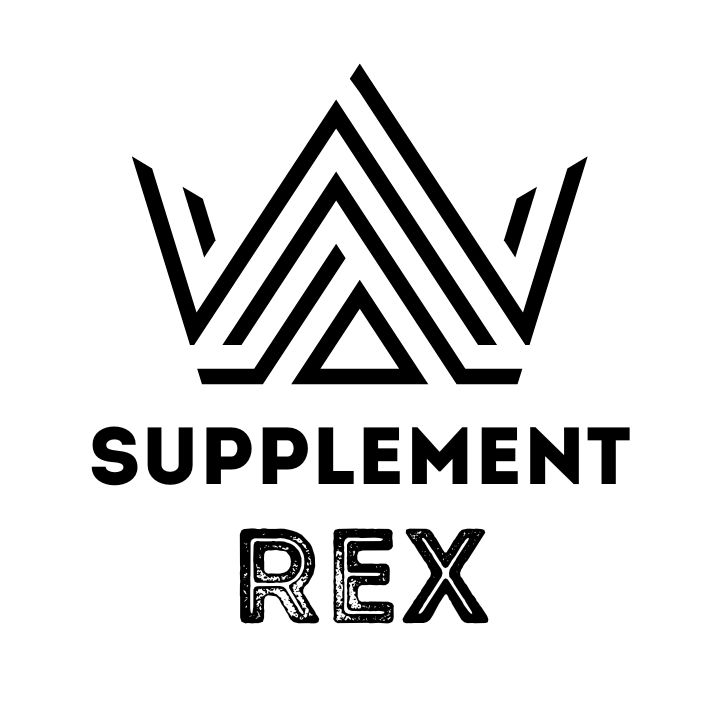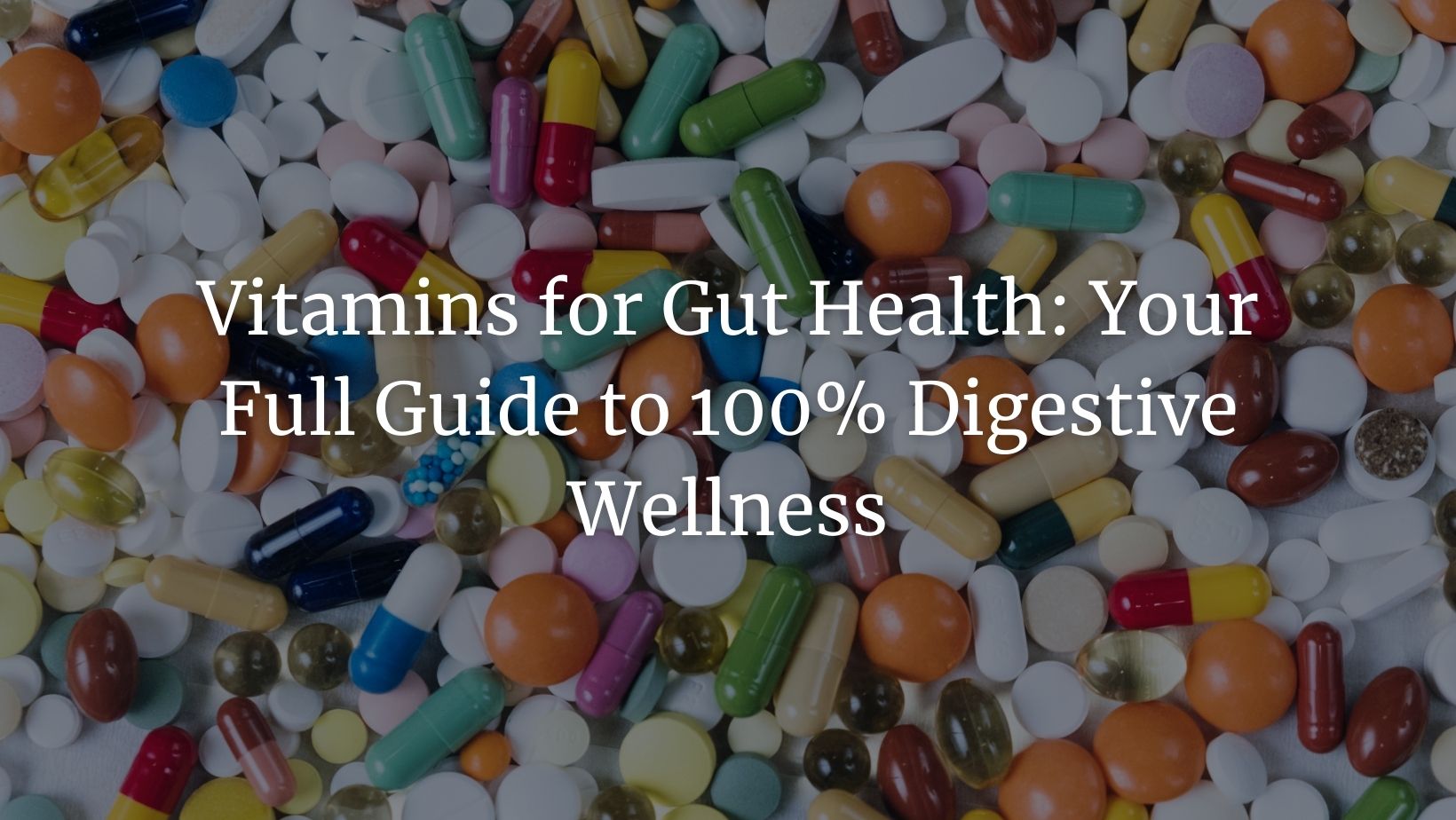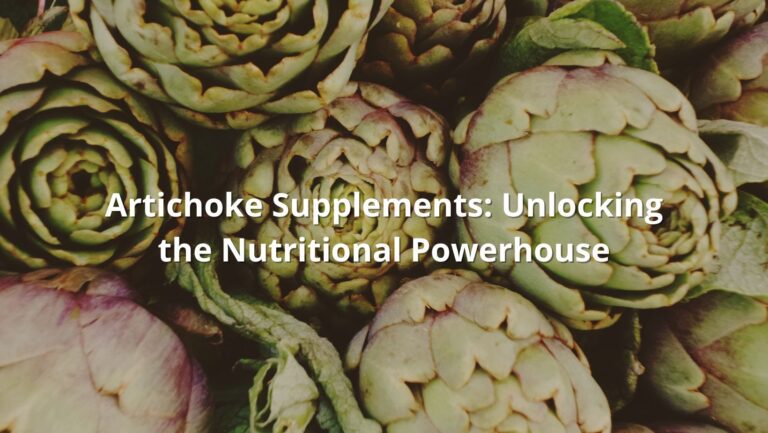Vitamins for Gut Health: Your 2023 Guide to 100% Digestive Wellness
Did you know your gut is often called your “second brain”? It’s an accurate way to put it. This complex system has a huge role to play in keeping us healthy (and, yes, that also includes mentally healthy & at top performance), and yet, it often doesn’t get the attention it deserves.
Here’s something to consider: a 2021 survey of over 70,000 folks from 33 countries found that a whopping 40% of them had a functional gastrointestinal disorder. Yep, that means gut health issues are not just trendy to talk about in wellness circles, they’re also very common!
So, what can we do to keep our guts happy? Well, there’s a lot of answers to that, and I promise to guide you through it. But one often overlooked piece of the puzzle is the role vitamins play in maintaining gut health.
In this guide, I’m going to cover all essential vitamins for gut health, especially those that tend to be in short supply in a typical Western diet. Together, we’ll explore why they’re so crucial, the best foods to get them from, and how to tweak your eating habits to make sure you’re getting enough.
Psst! These aren’t the only gut health supplements to explore. I recently also covered colostrum as a microbiome-restoring option, check out the article to learn more.
So, are you ready to join me on this journey towards better gut health? Let’s dive in! Together, we can work towards not just a healthier gut, but better overall well-being. Buckle up, and let’s get started.
Understanding the Gut: A Quick Overview
The term ‘gut’ might bring to mind just the stomach. But actually, when we talk about the gut, we’re referring to your entire digestive system – from your mouth all the way down to your rectum. This complex system is not just responsible for breaking down food and absorbing nutrients, but it also plays a critical role in your immune function and even your mood.
You see, your gut houses a massive ecosystem of bacteria known as the gut microbiota. Believe it or not, you’re more bacteria than you are human! For every human cell in your body, there are about 10 bacterial cells. These tiny inhabitants help digest food, protect against harmful pathogens, and even produce essential vitamins.
Yet, despite their importance, our lifestyle choices can often disrupt this delicate balance, leading to a range of gut health issues. Poor diet, lack of sleep, stress, and certain medications can all negatively impact our gut health, manifesting in symptoms like bloating, constipation, diarrhea, and even influencing our mental health.
In fact, according to the aforementioned survey, 40% of people globally reported functional gastrointestinal disorders. That’s a lot of people suffering, often silently, from issues that can be managed with the right approach, which includes the consumption of essential vitamins.
But before we explore these vitamins in detail, it’s important to note that not all gut issues can be solved with vitamins alone. Always consult a healthcare provider for personalized advice, especially if you have persistent symptoms or conditions.
In the next section, we’re going to dive into those key vitamins that support a healthy gut, starting with the ones that are most commonly deficient in a typical Western diet.
The Essential Vitamins for Gut Health
Vitamins are essential nutrients that our bodies need in small amounts to function properly. They are crucial for various bodily processes, including maintaining gut health. They assist in repairing the gut lining, supporting immune function, and fostering the growth of healthy gut bacteria. However, deficiencies in certain vitamins are common, especially in a typical Western diet, which can jeopardize gut health.
Now, let’s start with a vitamin that you might know as the “sunshine vitamin” – Vitamin D.
Vitamin D
Vitamin D is more than just a vitamin. It’s actually a hormone that your body makes when your skin is exposed to sunlight. It plays a crucial role in calcium absorption, immune function, and even mood regulation. But did you know that it also has significant implications for gut health?
Emerging research suggests that vitamin D can influence the diversity and balance of your gut microbiota. In fact, a deficiency in vitamin D has been linked to certain inflammatory bowel diseases, such as Crohn’s disease and ulcerative colitis.
Unfortunately, a lack of Vitamin D is quite common, especially in colder climates with less sunlight and in people who spend most of their time indoors.
So, how can you ensure you’re getting enough Vitamin D for a healthy gut? Sunlight is your best bet – just 15 minutes of sun exposure on your face and hands can be enough. However, during winter months or if you’re stuck indoors, fatty fish like salmon and mackerel, fortified foods, and supplements can also be beneficial.
Vitamin B Group
Next up on our list is not one, but a whole group of vitamins – the B vitamins. This family includes eight members:
- B1 (thiamine)
- B2 (riboflavin)
- B3 (niacin)
- B5 (pantothenic acid)
- B6 (pyridoxine)
- B7 (biotin)
- B9 (folate or folic acid)
- B12 (cobalamin).
Each member of the B vitamin family has its unique role but together, they contribute significantly to your overall gut health. They aid in digestion, help the body convert food into energy, support the nervous system, and are crucial for a healthy liver.
Moreover, specific B vitamins, like Vitamin B6 and B12, play a significant role in strengthening the immune system, thereby protecting the gut from harmful pathogens. Additionally, certain gut bacteria are known to produce B vitamins, especially B12 and biotin, creating a symbiotic relationship that promotes overall gut health.
Yet, despite their importance, deficiencies, especially of Vitamin B12, are quite common. This is particularly true for vegetarians and vegans, as B12 is mostly found in animal products.
So, where can you get these essential B vitamins? Animal products such as meat, dairy, and eggs are rich in most B vitamins, including B12. For the vegetarians and vegans among us, fortified foods, legumes, whole grains, and leafy greens can provide most B vitamins, but B12 may need to be obtained from supplements or fortified foods.
Vitamin C
Moving forward, let’s talk about a vitamin that is probably the most famous of them all – vitamin C. It’s well-known for its role in supporting a healthy immune system and maintaining skin health, but its importance for gut health is often overlooked.
Vitamin C, also known as ascorbic acid, aids in the repair and growth of the tissues lining your gut, and is a powerful antioxidant that can counteract harmful free radicals in the gut environment.
What’s more, recent research suggests that vitamin C may help boost the levels of beneficial bacteria in your gut, further underlining its significance for maintaining gut health.
So, where can we find this super-vitamin? Vitamin C is abundant in many fruits and vegetables. Citrus fruits like oranges and grapefruits, strawberries, bell peppers, and dark leafy greens such as kale and spinach, are all excellent sources.
Remember, while vitamin C supplements can be useful, especially for those with restrictive diets, it’s always best to aim for a varied diet filled with colorful fruits and veggies to meet your vitamin C needs.
Vitamin E
Let’s turn our attention now to vitamin E, a fat-soluble nutrient known for its powerful antioxidant properties. While not commonly deficient in a Western diet, Vitamin E is nonetheless crucial for maintaining gut health.
Vitamin E acts as an antioxidant, protecting your cells from damage by free radicals, unstable molecules that can cause damage if their levels become too high in your body. This includes the cells in your gut, where the balance between cell damage and repair is vital.
Interestingly, vitamin E might also help protect the intestinal barrier, which is a key piece of the puzzle when it comes to gut health.
Now, you might wonder if you need to supplement vitamin E. In most cases, a balanced diet provides sufficient Vitamin E for the average person, so supplementation is generally unnecessary unless recommended by a healthcare provider.
You can find vitamin E in a variety of foods. Nuts and seeds, spinach, broccoli, and even kiwi fruit are all good sources. Oils like wheat germ oil, sunflower oil, and safflower oil are particularly high in vitamin E.
Vitamin A
Finally, we get to vitamin A. Often associated with vision health, this fat-soluble vitamin also plays a crucial role in maintaining gut health.
Vitamin A is instrumental in the growth and repair of body tissues, including the lining of the gut. A healthy gut lining is vital for nutrient absorption and acts as a barrier against harmful substances. Furthermore, vitamin A supports immune health, with a significant proportion of the immune system residing in the gut.
Given that vitamin A is widely available in the Western diet, deficiency is rare. So, you likely won’t need to reach for a supplement. You can find abundant vitamin A in both animal and plant foods. Good sources include liver, fish, dairy products, and egg yolks. Plant-based sources rich in beta-carotene, which your body can convert into vitamin A, include carrots, sweet potatoes, spinach, and kale.
This is also one vitamin where I really, really don’t recommend you supplement it. In the West, vitamin A deficiency is extremely rare. Overdoing vitamin A, on the other hand, can have some serious health consequences. So, unless explicitly prescribed this by a doctor, please avoid vitamin A supplements and focus on a varied diet instead.
Supplement Wisely: A Cautionary Note
While vitamins are unquestionably important for our health, we do need a balanced perspective when it comes to supplementation. As we’ve seen, certain vitamins are often deficient in a typical Western diet, while others are usually plentiful.
And, even for the vitamins we lack, supplementation is not always the answer. Overdoing supplements can lead to its own set of problems, like vitamin toxicity. Plus, not all vitamins function in isolation – many work together in synergy, and getting them through food often means you’re also consuming other necessary nutrients.
A good rule of thumb is to aim for a balanced and varied diet first, filled with colorful fruits and vegetables, whole grains, lean proteins, and healthy fats. This will give you a whole bunch of gut health benefits – plus, general health benefits, too.
If you have persistent gut health issues or suspect you might be deficient in certain vitamins, it’s time to talk to a healthcare professional. They can provide personalized advice based on your individual health history and lifestyle. Although this site aims to provide interesting, educational content it’s not (and can’t be) medical advice. For that, you’ll have to go to your doctor – and please, if something’s wrong, don’t delay that visit.
Ultimately, achieving good gut health (and any sort of health) is about more than just taking vitamins. It’s about embracing a healthy lifestyle that includes not only a nutrient-rich diet but also regular exercise, sufficient sleep, and effective stress management.
In the next section, we’ll delve into these lifestyle factors and their role in maintaining a healthy gut. But for now, maybe take a moment to reflect on your own dietary habits – are there areas you could improve for your gut’s sake?
Building a Lifestyle for Gut Health (With Diet & More)
Anything health-related is holistic by definition. None of your systems work in isolation – that includes the digestive system and your microbiome, too.
While vitamins play a crucial role, they are just one piece of the puzzle. Let’s look at some other key factors that can influence your gut health (and that you shouldn’t skip if you want to maintain your microbiome):
- Regular Exercise: Engaging in regular physical activity helps stimulate the muscles in the gut and promote regular bowel movements. Exercise can also reduce inflammation and support a diverse gut microbiota.
- Enough Sleep: Lack of sleep can upset your gut’s natural rhythm, leading to changes in gut microbiota and potentially contributing to gut health issues. Aim for seven to nine hours of quality sleep per night to keep your gut happy.
- Stress Management: Chronic stress can wreak havoc on your gut, altering gut bacteria and increasing intestinal permeability. Incorporating stress management techniques like yoga, meditation, or simple deep-breathing exercises into your daily routine can have a positive impact on your gut health.
- Hydration: Water is essential for virtually every bodily function, including digestion. It keeps the lining of the intestines smooth and flexible, allowing food to move through your gut more easily.
- Avoiding Harmful Substances: Smoking, excessive alcohol consumption, and overuse of certain medications, like antibiotics, can negatively impact your gut health.
- Prebiotics and Probiotics: These “friendly bacteria” can help maintain a healthy balance of gut flora. Prebiotics are dietary fibers that feed the good bacteria, while probiotics are live bacteria found in certain foods and supplements.
Final Thoughts on Your Gut Health Journey
Vitamins play an important role in maintaining a healthy gut, from the commonly deficient vitamin D and vitamin B12, to the usually abundant vitamins E and A.
However, while vital, vitamins are only one component of your overall gut health strategy. A balanced, varied diet is your first line of defense, filled with colorful fruits, vegetables, whole grains, lean proteins, and healthy fats.
Beyond diet, incorporating regular exercise, adequate sleep, stress management techniques, proper hydration, and mindful habits regarding substances and medications are all integral parts of the picture. And let’s not forget about our gut’s microscopic friends, the prebiotics and probiotics. These are some of the most popular supplements lately and yet many people fail to get them from diet (so, make sure you stock up on that yogurt, kimchi, and kefir).
Achieving optimal gut health is not a one-size-fits-all journey, and it doesn’t happen overnight. It’s a journey of small, consistent steps towards a healthier lifestyle. Remember to consult a healthcare professional if you have persistent gut issues or suspect vitamin deficiencies.
Good luck on your journey to better gut health!
Which vitamin is best for gut health?
Vitamin D, C, and B12 are three vitamins you might be deficient in AND that matter for gut health. Vitamin E and A are also essential for your microbiome, but most people get enough of them. To enhance your gut health through vitamins, make sure you eat a varied diet with a lot of plants. Talk to a healthcare provider if you’re struggling with frequent GI issues and they can help you discover additional drugs and supplements to support you.
What supplements repair the gut?
Supplementing vitamins D, B12, and C if you are deficient in them can repair your gut. For the average person, a probiotic and a prebiotic can also be helpful. If you struggle with a chronic condition, however, it’s best to talk to your doctor first.
Do vitamins for gut health work?
Yes, we have some research showing vitamins can support gut health. For example, vitamin C can increase the good bacteria in your gut.
How do I strengthen my gut health?
Eat good food, mostly plant-based. Add plenty of probiotic foods like yogurt, sauerkraut, kimchi, or kefir. Exercise daily. Manage your stress. Sleep enough and work on sleep quality. Consider gut health supplements like vitamins and minerals to fill in any nutritional gaps.







